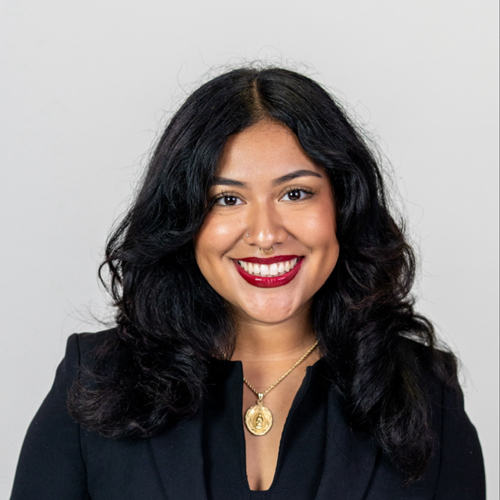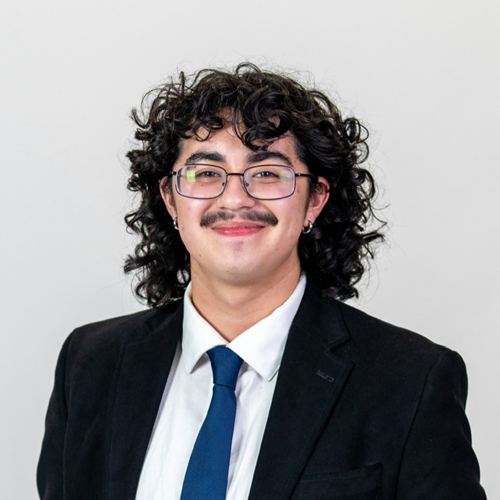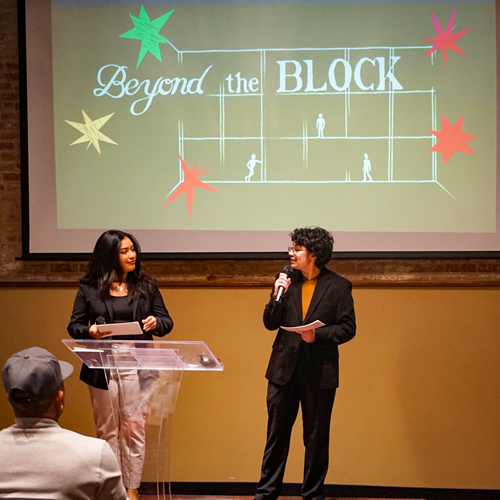Beyond the Block San Antonio, is a storytelling series that seeks to amplify the voices and narratives of people directly impacted by criminalization and incarceration within our communities. The project took place from March 2024 to December 2024, hosting nine system-impacted storytellers, poets, and artists. These participants collaboratively selectedthe theme of Beyond Hope and with this theme in mind, determined their format for expression– poetry, music, speech. Topics ranged from struggles with substance abuse, vulnerable experiences in childhood, recovery, starting non-profits in the community, and familial love providing the strength to push forward. The goal of our program is to alter thenarrative surrounding incarcerated individuals towards one that centers compassion and understanding among our community.
Alongside the robust team we created of local and national community partners, we hosted weekly workshops to provide performers with technical skills and to empower them toshare their personal narratives – some publicly sharing their experiences with incarceration for the first time. To prioritize the value of each performer's vulnerability and time, an honorarium was provided to each participant from the $12,000 that we raised for the project's vision. After six workshop sessions, on December 7th 2024, in a local theater space, we hosted Beyond the Block San Antonio with an audience of over 120 people. The community built through learning and storytelling acts as the groundwork for future shifts in the narrative around criminalization and incarceration, and plays a role in empowering overlooked communities.
How has/will this project impact your community, and what have you learned from it?
During our second semester of college, we took the Honors course taught by Dr. Mel Webb called “Moral Imagination and Incarceration.” As a part of the course, we spent everyThursday evening at Dominguez State Jail, studying literature and philosophy alongside a brilliant cohort of students, made up of incarcerated colleagues and classmates from UTSA. Through shared poems, laughter, and storytelling, we created bonds that inspired us to find ways to continue this learning and share it with our community, which manifested as Beyond the Block San Antonio. Our goals were to create a platform for system-impacted individuals to showcase their talents, and engage the San Antonio community in challenging preconceived notions— building an inclusive, nonjudgmental society.
We felt confident we accomplished the goals outlined because of our participants’ feelings towards our preparation workshops. It was not only an experience that prepared them tospeak publicly, for the majority of our participants, it was a chance “to let go of a lot of shame and narratives that were given (...), to take ownership of [their] life and finally [have] thepower and control to share the message of these harmful systems (...) [it] was a healing experience and for once [we] felt a sense of love and belonging in a group that was nonjudgmental” (Beyond the Block 2024 Participant Survey). We echoed throughout our workshop and event programming one of our primary lessons: incarcerated people are not IN our community, they ARE our community. We learned that to convey that we shoulder the responsibility for compassionate community building that allows people to have agency in their narrative, we must always build our programming from the ground up.
This approach was felt by audience members during the event. As the event concluded, many audience members talked about the impactful nature of the experience, most of them recalling particular performer’s anecdotes that stuck with them. We felt this sentiment of connection long after the event concluded in our participant group chat. It reminded us of the second lesson we learned, that hope is a discipline. Mariame Kaba, an organizer, abolitionist educator, archivist and curator, says that this means “hope is a set of practices through which we change the conditions we live in.” Our participants’ sustained commitment to connection reminds us that hope is a practice we engage in daily, long after the event date.
Beyond lessons about community and connection, this organizing process taught us to prioritize ensuring our intentions are aligned with our actions. Regardless of if it makes the process longer, it is more important to not tokenize the real experiences of individuals. We learned you avoid tokenization by being in a continuous conversation with impacted communities. For us, this event is the foundation for important work that still must be done to foster inclusion and compassion in our society.
Back to the Community Engagement Award Page


